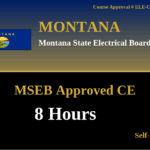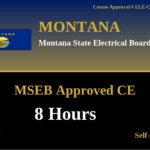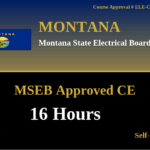
Starting an Electrical Contracting Business in Montana
Starting an Electrical Contracting Business in Montana
Montana’s rugged beauty and growing communities are creating significant opportunities for skilled tradespeople. For experienced electricians, the dream of being your own boss is more attainable than ever. But transforming your technical expertise into a thriving enterprise requires more than just knowing your way around a circuit panel. Starting an electrical contracting business in Montana involves navigating state licensing, setting up a solid legal structure, and understanding the market. This guide provides the industry perspective you need to take that next big step in your career, moving from employee to entrepreneur in Big Sky Country.
Understanding Montana’s Licensing Landscape: Contractor vs. Electrician
The first and most crucial step is understanding the distinction the Montana State Electrical Board makes between an individual electrician’s license and an electrical contractor’s license. Your personal license (such as a journeyman electrician license Montana or a Master license) proves your technical qualifications. A contractor license, however, is a business license that authorizes your company to bid on jobs and perform electrical work.
In Montana, your business will apply for one of two types of contractor licenses, and the choice determines the scope of work your company can legally perform.
Choosing Your Path: Limited vs. Unlimited Electrical Contractor
The type of contractor license you can obtain is directly tied to the highest-level licensed electrician responsible for the company’s work – either you or a full-time employee.
- Limited Electrical Contractor: This license requires a licensed journeyman electrician to be the responsible party for the business. As a limited contractor, your company’s scope is restricted to residential construction projects consisting of less than five living units in a single structure. This is an excellent starting point for entrepreneurs focusing on the home building and renovation market.
- Unlimited Electrical Contractor: To operate without restriction, your business needs an unlimited license. This requires a licensed Master Electrician to be the responsible party. An unlimited license allows your company to perform residential and commercial electrical work. Meeting the Master Electrician requirements Montana is the gateway to the most significant and complex projects.
Building Your Business Foundation: The Legal & Financial Checklist
Once you’ve determined your licensing path, it’s time to build the business structure around it. This involves careful planning and adherence to state regulations to ensure your company starts on a firm legal and financial footing.
Your Electrical Contractor Business Plan
Before filing any paperwork, draft a comprehensive electrical contractor business plan. This document will be your roadmap, outlining your services, target market (e.g., new residential construction, commercial service calls), marketing strategy, and financial projections. A solid plan is essential for securing financing and making informed decisions as you grow. Thinking through these steps now can dramatically increase your chances of long-term success. For more ideas on growing your business, it’s helpful to see how professionals can boost their earning potential through strategic planning.
Registration, Insurance, and Bonding
According to the Montana State Electrical Board, all applicants for a contractor license must demonstrate compliance with several key state requirements.
- Business Registration: First, you must register your business name and structure (e.g., LLC, S-Corp, Sole Proprietorship) with the Montana Secretary of State.
- Electrical Business Insurance Montana: General liability insurance is critical for protecting your business from claims of property damage or bodily injury. While the state sets minimums for some licenses, the complexity of your projects should dictate your coverage amount.
- Workers’ Compensation Insurance: State law requires proof of compliance with workers’ compensation insurance Montana if you have employees. If you are a sole proprietor with no employees, you may be able to file for an Independent Contractor Exemption Certificate (ICEC) with the Montana Department of Labor & Industry, which exempts you from needing a workers’ comp policy for yourself.
- Surety Bonds for Electricians Montana: The state of Montana does not have a universal, statewide requirement for electrical contractors to be bonded. However, many municipalities, require local surety bonds for electricians to work within their jurisdiction. You must check with the city or county offices where you plan to work to ensure you meet their local bonding rules.
Adhering to Technical & Safety Standards
A successful business is a compliant one. Your reputation and legal standing depend on consistently meeting the highest technical and safety standards on every job site.
National Electrical Code (NEC) Montana
The Montana State Electrical Board enforces the National Electrical Code (NEC) as the standard for all electrical installations. It is your responsibility as a contractor to ensure all work performed by your company adheres to the currently adopted edition of the NEC and Montana amendments. The Montana State Electrical Board currently adopts the 2020 edition of the NEC as the standard for all electrical installations.
Upholding OSHA Electrical Safety Standards
Beyond the NEC, your business must comply with all OSHA electrical safety standards. This includes providing proper personal protective equipment (PPE), ensuring lockout/tagout procedures are followed, and maintaining a safe work environment for your employees and the public. A strong safety culture protects your team and your business’s bottom line.
Equipping Your Business for Success
With the legal and technical requirements handled, you can focus on the tools and team that will make your business profitable and competitive.
Tools of the Trade: Electrical Estimating and Bidding Software
In today’s market, bidding jobs with a notepad and calculator can put you at a disadvantage. Investing in professional electrical estimating and bidding software can streamline your workflow, improve accuracy, and help you produce competitive, profitable proposals. This technology allows you to manage material costs, labor hours, and overhead to protect your margins on every project.
Growing Your Team: Hiring Licensed Electricians in Montana
As your business grows, you’ll need to expand your team. When hiring licensed electricians Montana, it’s essential to verify their license status with the state board. Whether you’re hiring an apprentice, a residential electrician, or a journeyman, ensuring they are properly licensed and a good fit for your company culture is key. A strong team is your most valuable asset, a fact highlighted in the Montana electrician job market analysis.
Staying Compliant and Competitive
Launching your business is just the beginning. Long-term success requires an ongoing commitment to professional development and regulatory compliance.
Montana Electrical Continuing Education
The Montana State Electrical Board requires all licensed electricians – including Residential, Journeyman, and Master Electricians – to complete 16 hours of electrical continuing education Montana every two years to renew their licenses. At least eight of those hours must be dedicated to NEC code updates. These requirements ensure you stay informed about the latest safety protocols and technological advancements. High-quality online electrical courses provide a convenient way to meet these state mandates and keep your skills sharp.
When your renewal is due, you can explore our Board-approved courses to meet your CE requirements. Fulfilling your educational obligations is not just a regulatory hurdle; it’s an investment in your expertise and your business’s future.
Ready to fulfill your renewal requirements? Browse our courses approved by the Montana State Electrical Board.
Related Resources
- Starting an Electrical Contractor Business in Wyoming
- Can an Electrician Get a General Contractor License?
Launching your own electrical contracting business in Montana is a challenging yet incredibly rewarding journey. By understanding the licensing structure, building a solid legal and financial foundation, and committing to ongoing education, you can build a successful company that stands the test of time.
Montana Continuing Education Courses
Explore our board-approved continuing education courses for Montana professionals:
View CE RequirementsMontana – 8 hours NEC Code Updates (Part 1)
Montana – 8 hours NEC Code Updates (Part 2)
Montana – 16 hours NEC 2023 Code Changes
Disclaimer: The information provided in this educational content has been prepared with care to reflect current regulatory requirements for continuing education. However, licensing rules and regulations can vary by state and are subject to change. While we strive for accuracy, ExpertCE cannot guarantee that all details are complete or up to date at the time of reading. For the most current and authoritative information, always refer directly to your state’s official licensing board or regulatory agency.
NEC®, NFPA 70E®, NFPA 70®, and National Electrical Code® are registered trademarks of the National Fire Protection Association® (NFPA®)






